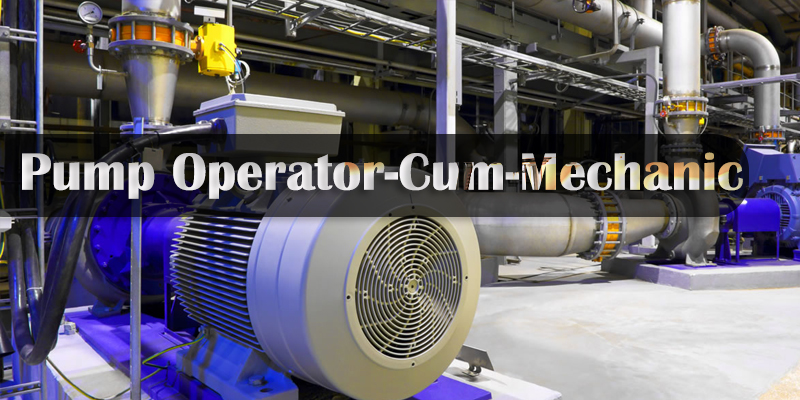
ITI Pump Operator-cum-Mechanic Syllabus (English)
Course Overview
-
Trade Name: Pump Operator-cum-Mechanic
-
Duration: 1 Year (2 Semesters)
-
NSQF Level: Level 4
-
Eligibility: 10th Grade Pass with Science and Mathematics
-
Objective: To train candidates in installing, operating, maintaining, and repairing pumps (centrifugal, reciprocating, rotary), preparing them for roles as pump operators, mechanics, or self-employed technicians in industries like water treatment, oil and gas, and manufacturing.
-
Certification: National Trade Certificate (NTC) by NCVT
Detailed Syllabus
Semester 1
Trade Theory
-
Introduction to Pumps: Types (centrifugal, reciprocating, rotary), applications in waterworks, refineries, and industries.
-
Safety Practices: PPE (gloves, safety glasses, boots), electrical safety, handling hazardous fluids, fire prevention.
-
Pump Components: Impellers, shafts, bearings, seals, valves; functions and materials (carbon steel, stainless steel).
-
Basic Mechanics: Principles of fluid flow, pressure, head, cavitation, priming, and pump efficiency.
-
Tools and Instruments: Hand tools (wrenches, pliers), measuring tools (vernier caliper, micrometer ±0.01 mm), torque wrenches.
-
Fasteners and Bearings: Types (bolts, nuts, lock washers), plain/journal bearings, anti-friction bearings; fitting and alignment.
-
Basic Electricity: Single-phase/three-phase motors, wiring, earthing, circuit protection.
Trade Practical
-
Safety Drills: Wearing PPE, practicing lockout-tagout procedures, handling chemical spills.
-
Tool Usage: Using hand tools for assembly, measuring dimensions (±0.1 mm accuracy).
-
Pump Dismantling: Disassembling centrifugal pumps, identifying components (impeller, casing, shaft).
-
Bearing Maintenance: Removing and fitting bearings, checking alignment, lubricating with grease/oil.
-
Fastener Practice: Tightening bolts with torque wrench, using locking devices (spring washers, lock nuts).
-
Electrical Testing: Checking motor continuity, testing insulation resistance with multimeter.
-
Project Work: Dismantle and reassemble a 1 HP centrifugal pump, ensuring leak-free operation.
Hours: Theory: 160 hours | Practical: 240 hours
Semester 2
Trade Theory
-
Advanced Pump Systems: Reciprocating pumps, rotary pumps (gear, vane), submersible pumps; performance curves.
-
Pump Maintenance: Troubleshooting (misalignment, cavitation, leaks), bearing replacement, seal maintenance.
-
Hydraulics and Pneumatics: Hydraulic actuators, pneumatic valves, their role in pump systems.
-
Welding and Fabrication: Basic arc welding, gas cutting for pump repairs, non-destructive testing (dye penetrant).
-
Pump Installation: Site preparation, foundation alignment, pipe connections, priming procedures.
-
Quality Control: Testing pump performance (flow rate, pressure), adherence to standards (ISO, BIS).
-
Entrepreneurship: Starting a pump repair shop, market trends (e.g., energy-efficient pumps).
Trade Practical
-
Pump Troubleshooting: Diagnosing issues (low flow, high vibration), correcting shaft misalignment (±0.05 mm).
-
Reciprocating Pump Maintenance: Servicing pistons, valves, and seals; reassembling with proper gasket selection.
-
Rotary Pump Repair: Inspecting gear/vane pumps, replacing worn components, testing for leaks.
-
Welding Tasks: Performing arc welds on pump casings, ensuring defect-free joints.
-
Installation Practice: Installing a submersible pump, connecting pipes, and testing output (flow rate ±5 L/min).
-
NDT Testing: Conducting dye penetrant tests on welds, identifying surface cracks.
-
Project Work: Overhaul a 2 HP reciprocating pump, test performance, and document flow rate and pressure.
Hours: Theory: 160 hours | Practical: 240 hours
Additional Components
-
Workshop Calculation and Science
-
Calculations: Pump power, flow rate, head loss, efficiency; unit conversions (liters/min to m³/hr).
-
Science: Fluid mechanics, pressure dynamics, thermal effects on bearings, motor torque.
-
Hours: 80 hours/year
-
-
Engineering Drawing
-
Drawings: Pump assembly diagrams, piping layouts, sectional views of impellers and casings.
-
Hours: 80 hours/year
-
-
Employability Skills
-
Communication: Reading technical manuals, reporting maintenance issues, client interaction.
-
IT Literacy: Using pump design software, inventory systems, online spare parts catalogs.
-
Soft Skills: Time management, teamwork, resume writing, interview preparation.
-
Hours: 60 hours/year
-
Assessment and Certification
-
Exams:
-
Theory: Written exams per semester (MCQs, descriptive questions).
-
Practical: Pump assembly, repair, troubleshooting, performance testing, safety compliance.
-
-
Evaluation Criteria: Accuracy in repairs, pump performance, adherence to safety and standards.
-
Certification: NCVT National Trade Certificate (NTC), globally recognized.
Career Opportunities
-
Employment: Pump operator, mechanic, or service technician in water treatment plants, oil refineries, manufacturing units, or construction.
-
Self-Employment: Pump repair shop, spare parts dealership, freelance maintenance services.
-
Further Studies: Diploma in Mechanical Engineering (lateral entry), certifications in pump technology or hydraulics.
Trade Type
- 28 views